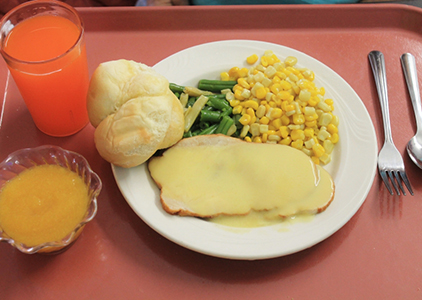
Would You Like a Burger With Your Bypass?
By Team Reboot
Editor’s note: Our friends over at Forks Over Knives are innovators in this health and wellness world and we enjoy keeping up with them. Recently they shared an article that we thought was pretty eye-opening, and we thought you’d think so too. The author, Cardiologist Robert Ostfeld, MD, MSc is the founder and director of the Cardiac Wellness Program at Montefiore Medical Center in New York City, where he encourages patients to embrace a whole-foods, plant-based diet. He earned his MD at Yale and his MSc in epidemiology at Harvard, and he is an associate professor of clinical medicine at the Albert Einstein College of Medicine.
“Congratulations… You survived bypass surgery! Here, have a burger.”
I often hear some version of the above from friends and acquaintances: during a hospital stay, they or their loved ones are served the types of foods that may have caused their problem in the first place.
The disconnect between cause and effect just kills me.
A Missed Teaching Opportunity
A hospital stay can be scary. People are confronted with their mortality and they may feel a loss of control and a loss of independence. Yet even in this confusing time, a hospital stay has the potential to be a great teachable moment. I often wonder how much more powerful our interventions would be if they were coupled with education about how lifestyle changes can actually get to the root of the problem. Many surgeries just sweep the problem under the rug for a time, not getting to the underlying cause at all – which is frequently lifestyle.
Here is the scenario that Western medicine often offers its patients:
“Yes, Ms. Jones. We will need to do coronary bypass surgery tomorrow, where we will saw your chest in half, stop your heart, and sew a vein from your leg on to your heart. You will be in intensive care for a couple of days afterward, and in about three months you will be fully back on your feet.”
It’s great that we can perform these procedures if we have to…But it is better to prevent them.
The time for change is yesterday.
How It Could Be…
Now imagine a scenario in which Ms. Jones’s care includes the following:
“During your recovery we will be feeding you foods that will nourish your body and set you on a course to drastically reduce your likelihood of recurrence. We will send you home with videos and other material that will teach you how eating plants can reduce or eliminate your diabetes, high blood pressure, high cholesterol, and coronary artery disease. We will offer you suggestions for eating out and instructions for buying and preparing simple nutritious meals at home so that you can maintain a healthier lifestyle.”
Picture Ms. Jones’s entire medical team, including her surgeon, taking the time to emphasize (both to her and her family) the importance of plant-based eating for her future well-being. And instead of a steak or burger and fries, picture a satisfying plant-based meal filled with leafy greens and other vegetables, whole grains, beans, and fruit.
With this kind of care and education, her hospital stay could serve as a springboard to a healthier life.
The Future of Hospital Food
Increasingly, the news is not all bad. Adventist hospitals have long offered many vegan options. And in recent years, numerous US hospitals are making strides to improve the quality of the food they serve, including planting gardens, offering up more plant-based meals, and removing fast food restaurants from their lobbies. The hospital where I work, Montefiore Medical Center in New York City, will soon be piloting plant-based meals for inpatients. Its cafeteria, in addition to having a terrific salad bar, serves vegan sushi, smoothies, and other delicious plant-based options.
Times are changing, and you can help: if you are hospitalized, ask your medical team about plant-based options. Bring it up with your local physician and local politicians. Your voice will go a long way.
I look forward to the time when serving steak, burgers, fries, and chicken nuggets is no longer customary in hospitals.
Because right now, it just kills me.